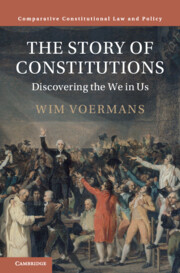Book contents
- The Story of Constitutions
- Comparative Constitutional Law and Policy
- The Story of Constitutions
- Copyright page
- Dedication
- Epigraph
- Contents
- Figures
- Prologue
- 1 Introduction
- Part I Constitutional Diffusion
- Part II The History of the Constitution
- 4 Precursors
- 5 Etched into Collective Memory
- 6 Roman Roots
- 7 Mediaeval Constitutions
- 8 Early-Modern Constitutions
- 9 Generations
- 10 Second Generation
- 11 Third Generation
- 12 Fourth Generation
- 13 Fifth Generation
- 14 Sixth Generation
- 15 The Seventh Generation
- 16 The Eighth Generation
- 17 What Are the Lessons of History?
- Part III Concepts, Shapes and Types of Constitutions
- Part IV Effects
- Part V The Imagined Order of the Constitution
- References
- Name & Author Index
- Subject Index
4 - Precursors
from Part II - The History of the Constitution
Published online by Cambridge University Press: 19 October 2023
- The Story of Constitutions
- Comparative Constitutional Law and Policy
- The Story of Constitutions
- Copyright page
- Dedication
- Epigraph
- Contents
- Figures
- Prologue
- 1 Introduction
- Part I Constitutional Diffusion
- Part II The History of the Constitution
- 4 Precursors
- 5 Etched into Collective Memory
- 6 Roman Roots
- 7 Mediaeval Constitutions
- 8 Early-Modern Constitutions
- 9 Generations
- 10 Second Generation
- 11 Third Generation
- 12 Fourth Generation
- 13 Fifth Generation
- 14 Sixth Generation
- 15 The Seventh Generation
- 16 The Eighth Generation
- 17 What Are the Lessons of History?
- Part III Concepts, Shapes and Types of Constitutions
- Part IV Effects
- Part V The Imagined Order of the Constitution
- References
- Name & Author Index
- Subject Index
Summary
History helps us understand how abstract (imagined) constructs providing artificial trust and recognition - needed for large scale cooperation - have evolved over time, greasing and optimizing human cooperation amongst strangers. This first chapter on the history of constitutions in this book looks into the earliest examples of constitutions known to man. Prehistoric constitutions developed for the first time in the city states of Mesopotamia; the Code of Hammurabi being its most famous example. These precursors were always close-knit with religion.
Keywords
- Type
- Chapter
- Information
- The Story of ConstitutionsDiscovering the We in Us, pp. 71 - 81Publisher: Cambridge University PressPrint publication year: 2023

